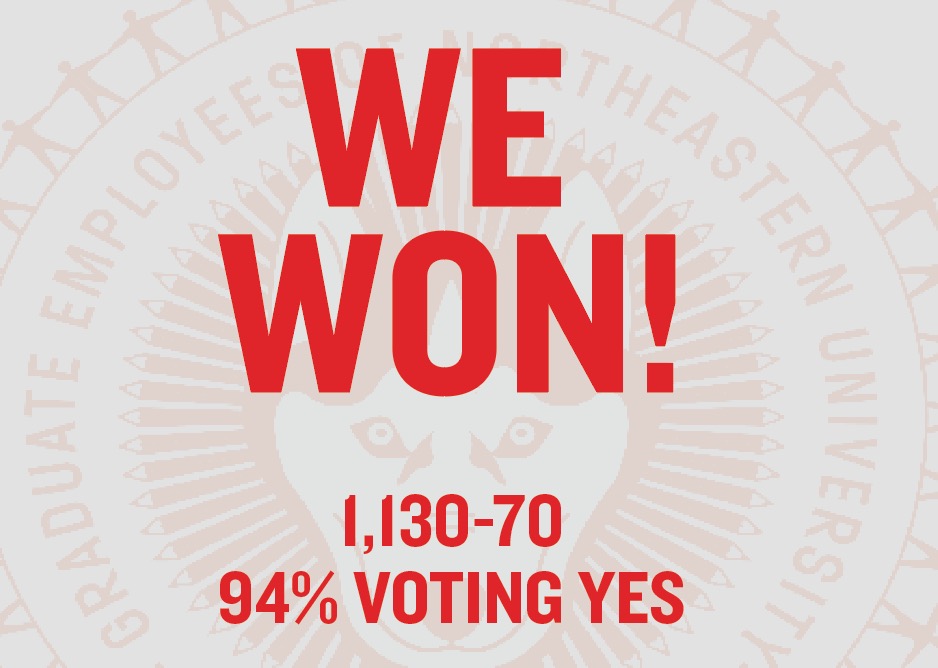
On Sept 19th, 20th and 21st, we voted overwhelmingly to officially certify our union, the Graduate Employees of Northeastern University – UAW (GENU-UAW). We began our organizing in 2015 as many other grads at universities like Columbia, Harvard, and NYU began organizing. We were ready for our election in 2016, but because of the anti-labor policies of the Trump administration, we had to wait.
We need a union now more than ever. Graduate workers are fundamental to Northeastern’s educational and research mission. We teach, grade papers, perform cutting edge research and more. Simply put, the university works because we do. But too many of us struggle with the sky high cost of living in Boston. Rent and fees are becoming more prohibitive, forcing us to move further and further away. Despite Northeastern’s annual increases in tuition and a $1.4 billion endowment, some of us are earning just $26,000 a year or making nearly minimum wage. Over the past several years, our work demands have continued to grow as our wages and benefits remain stagnant. It is not sustainable. Below are some of the reasons we’re voting yes for our union:
Making one of the most expensive markets in the country affordable
Graduate workers are often forced to find two or three roommates to be able to afford living in the Boston area, and often need to move every year to find a more affordable home because of rent increases. Some of our advisors often work hard to try to help, but ultimately the decision of our pay is made above them.
With a union, we will elect graduate workers to sit across the table with the Northeastern administrators who do make these decisions and negotiate a standard of living that allows us to focus on providing the highest quality teaching and research.
At other universities, graduate workers have been able to negotiate for improvements to raise the standards:
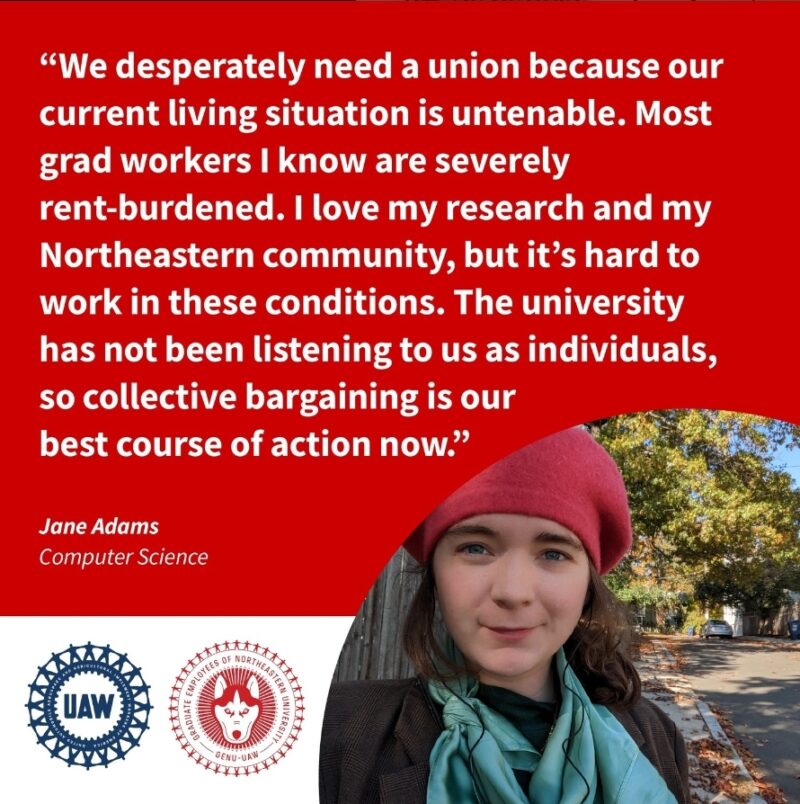
Fighting for quality healthcare
The healthcare plan here at Northeastern is not good enough. We experience out of pocket costs that are too high and face a shrinking pool of providers in the area. We often struggle to find mental healthcare providers that take our insurance and tend to wait long times to see someone. Furthermore, comprehensive dental and vision care are practically non-existent.
Other unionized graduate workers have been able to sit down and bargain for significant improvements:

Protections for international graduate workers
International graduate workers have the same exact rights as domestic workers in the United States, allowing them to participate in the union. Due to visa restrictions international grads are often part of our most vulnerable communities, because they are unable to obtain an additional off campus income. Furthermore, they pay additional tuition fees, experience a higher cost of moving to Boston, and have their visa status looming as a constant threat which administrators and faculty often exploit. By bargaining together we can ensure in our contract that domestic and international students have the same protections and working conditions.
At other universities, unionized grads have been able to win additional support for international workers.

Protections from harassment and discrimination
Northeastern University has a systemic problem with harassment and discrimination. With attempts to intimidate BIPOC and Trans organizers on multiple occasions, and the exploitation of international grad labor, we are forced to navigate a system designed with only the university’s best interests in mind.
With a union, we can bargain for better protections, including neutral third party binding arbitration. This process puts a case in front of a neutral arbitrator, hears the facts of the case, and makes a decision based on the facts. Because they are paid by both the union and the university, they are not bound to either.
At other universities, graduate workers have been able to win better protections from harassment and discrimination.
At UConn, graduate workers won arbitration for harassment and discrimination cases.

Protections from academic abuse
We graduate workers are often proud to go the extra mile due to our commitment to research and quality education, but sometimes advisors take that commitment and exploit it, damaging our personal lives and mental health. This behavior not only harms the reputation of the university, but it forces good researchers and teachers out of their industries– often in a discriminatory way.
With a union, we can bargain for protections from abuse of work, including workload protections and requirements like ensuring that we have the right equipment, workspace, and protections from working in dangerous circumstances.
Workers at Columbia (see “Workweek”), Harvard (Article 16), UConn and WPI have all won protections from abuse, ensuring they can continue the work on their degree without having to face unrealistic demands from abusive advisors.

A more equitable workplace
With a union, we hope to bargain for improvements for our marginalized members.
Parents. Graduate workers have won benefits for parents such as guaranteed lactation stations on campus, and can negotiate for assistance with childcare costs. In addition, with the harassment, discrimination and bullying grievance procedures mentioned above, we hope to help grad workers feel comfortable with their choice to become a parent.
LGTBQIA+ Community. Graduate workers have won protections from discrimination for sexual orientation, gender identity and expression at many universities. At WPI, graduate workers won protections and a commitment from the university to help assist graduate workers through a gender transition. At the University of Michigan, unionized grad workers won a host of gender affirming healthcare coverage rights.
Sexual Harassment. Graduate workers at UConn have won the right to pursue sexual harassment claims through the union, rather than just Title IX which historically has only functioned to protect universities from liability rather than victims.

More Graduate Worker Voices
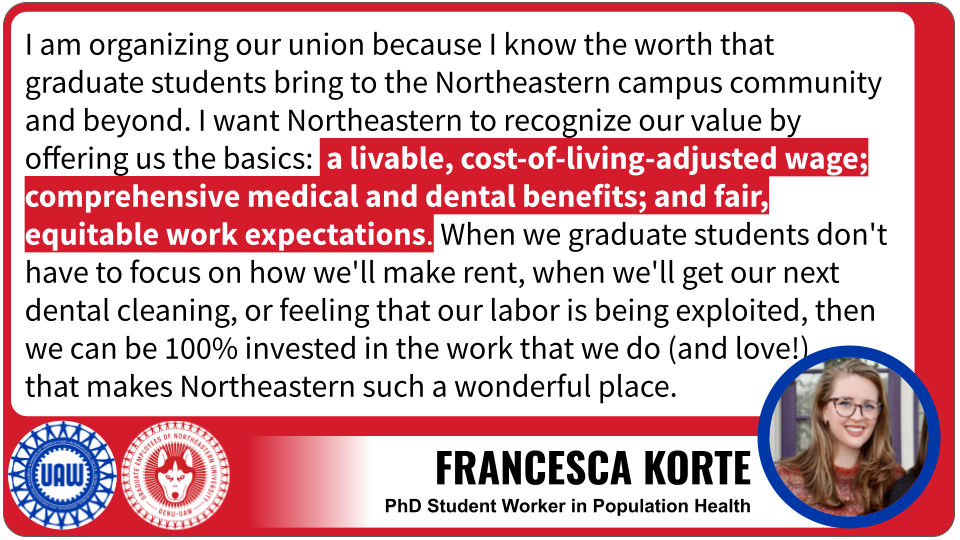
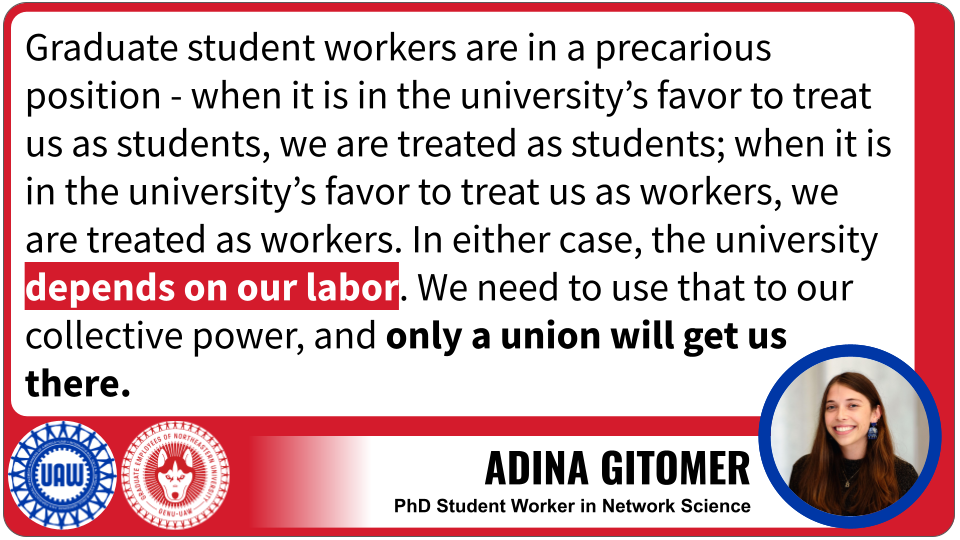
“I will fight for a union because Northeastern runs on the labor of graduate workers, yet denies us a living wage. #Boston is one of the most expensive cities in the country…
— GENU-UAW (@nugradunion) February 10, 2023
"United we bargain, divided we beg!” ✊ #NEU #BostonMA #MApoli #Solidarity #Union #GradSchool #PhDlife pic.twitter.com/EJjo59RMZi
"We need union representation because we have been undervalued, exploited, and underpaid for too long. Academia would not function without graduate students…" #NEU @Northeastern #GradWorkers #Union #PhDchat #PhDlife #PhDvoice #solidarity pic.twitter.com/76zY9Ifoth
— GENU-UAW (@nugradunion) January 31, 2023
“I will fight for a union because all workers deserve a voice, dignity, and a living wage.”#Union #PhDlife #PhDvoice #AcademicTwitter #solidarity #NEU #BostonMA #AcademicChatter #GradSchool #Northeastern pic.twitter.com/yKsFwftdGF
— GENU-UAW (@nugradunion) February 1, 2023
Q: Why do we deserve a union?
— GENU-UAW (@nugradunion) January 25, 2023
A: "…all student workers deserve safer working conditions and living wages."#gradschool #PhDchat #PhDvoice #Academia #AcademicTwitter #union #gradstudents #surveillance pic.twitter.com/Dhm0XAcCJ1
“I fight for a union because present and future grad workers deserve the dignity of dental and vision insurance, visa protections, discrimination protections, and parental leave." #discrimination #union #parentalleave #insurance #MApoli #NEU @Northeastern #Physics #PhDlife pic.twitter.com/bPFJcVEvxv
— GENU-UAW (@nugradunion) February 12, 2023
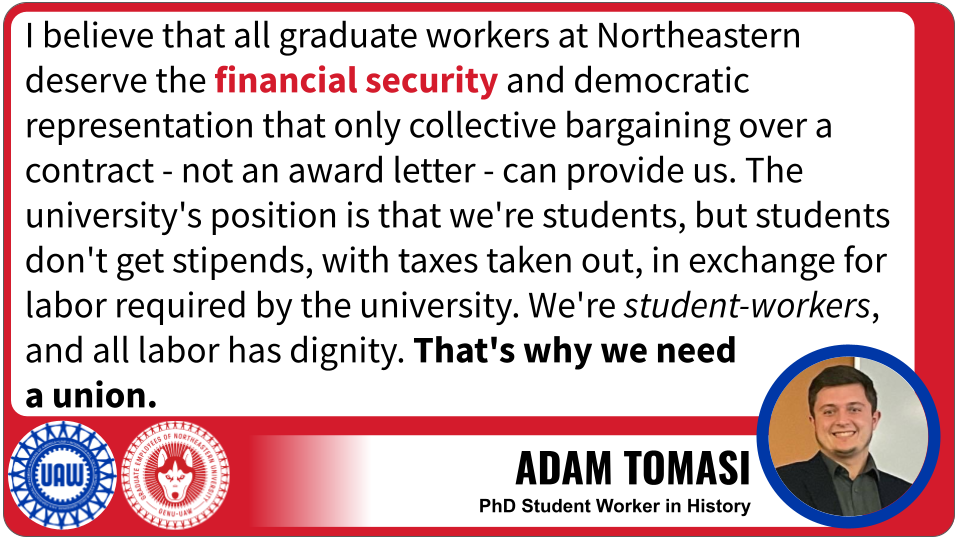
“We deserve a union because @Northeastern can’t function without us!” ✊#Solidarity #Union #NEU #PhDvoice #AcademicTwitter #AcademicChatter pic.twitter.com/FZGBcH7v4u
— GENU-UAW (@nugradunion) January 30, 2023
"I organize because I used to work in tech and experienced workplace discrimination at my job before NEU. I don’t want anyone who experiences #discrimination at #NEU to lack recourse or options. Workers deserve power!”#AcademicChatter #PhDlife #union #solidarity #Northeastern pic.twitter.com/3fpWLhxHOg
— GENU-UAW (@nugradunion) January 28, 2023
Frequently Asked Questions
What is a union?
GENU-UAW is an organization of student workers joining together to build power, create a democratic workplace, negotiate improvements to our working conditions, and secure our benefits in a binding, democratically approved union contract that cannot be unilaterally changed by the university administration.
Winning a union will allow us to collectively bargain a union contract which is a legally enforceable document that guarantees our conditions of employment. Those benefits cannot be changed unilaterally by the university without negotiating with our union. Here are some examples of what other student workers have won with a union contract:
- Annual, across-the-board stipend increases and timely payments.
- Enhanced dental, vision, and mental health insurance (including lower co-pays for services and prescriptions).
- Improved family benefits, including health coverage for dependents, child-care subsidies and paid maternity leave.
- Workload protections for hours worked, vacation, and leave, so that students are free to teach or research as many hours as they choose without being unfairly pressured.
- Subsidized public transportation services, parking, and housing.
- Protections against discrimination, sexual harassment, and assault.
- Fair and transparent grievance procedures.
- Improved disability access and resources for people of color.
- Protections for international graduate workers.
Why the United Auto Workers?
We chose to work with the UAW because they are the largest union of graduate workers in the country, and have a history and experience winning strong union contracts.
The UAW represents more than 100,000 academic workers across the United States, including more graduate student employees and postdocs than any other union. In the last eight years alone over 40,000 academic workers around the country have chosen to become part of the UAW.
The UAW has particular experience with helping to negotiate and enforce strong student worker contracts. Most recently, student workers at Columbia University in NYC voted by 96.7% to ratify their first contract with a majority participating. Harvard student workers approved their contract in 2021.
Last year, the University of California recognized Student Researchers United-UAW as representative for more than 17,000 workers, after a supermajority of UC student researchers signed cards selecting SRU-UAW as their union. In addition to drawing on the UAWʼs wide experience bargaining contracts with university administrators, we can exercise a stronger political voice through the UAW. With active members at more than 45 major campuses across the US, the UAW has become a strong advocate on policy issues that matter to us as academics, such as federal support for science funding and enhancing the rights of international research scientists.
Will I have to pay union dues? How much do I pay?
We do not pay dues until we have voted to ratify (accept) our first contract. This means that we won’t pay anything until we see benefit gains first. Members pay dues to pay for staff, experts and other resources that make sure we can negotiate a strong contract with the administration and enforce it effectively.
UAW dues are 1.44% of gross income from the work covered by our contract, and will only be paid by those members employed as TAs, RAs, or in other positions covered by the union contract. Some union locals, like the local in which NYU’s student employees are members, choose to pay a higher dues rate if they feel they need the extra resources. Any rate higher than the UAW standard must be voted on by local membership.
Typically all workers in a bargaining unit are required to pay dues or some type of agency fee. All workers will benefit from the same union contract, and the union is obligated to represent all workers and enforce the contract on their behalf, regardless of membership.
Will I have to go on strike? Will it negatively impact the progress of my research?
Members of the union will vote to decide if a strike is necessary. Under the UAW constitution, 2/3 of those participating in a strike authorization vote must vote in favor of a strike in order to authorize the union to call one. While a strike is most effective when we all stand together, it is up to individual members whether to go on strike, and the UAW does not fine members who do not participate.
Although it is sometimes necessary, striking is an important and powerful last resort when an employer persistently refuses to negotiate in good faith. When other options for bringing an employer to the bargaining table have been exhausted, a strike is a powerful way to remind employers and the public of the importance of our work.
Strikes also work. At the University of California, 17,000 graduate researchers went on strike to win their first contract and won significant increases to pay, benefits and protections.
Ultimately, we will get to decide if striking is in our best interest, and when, both as a union and individually.
Will international students benefit from joining the UAW?
With roughly 100,000 academic workers, the UAW has become a powerful organization advocating to improve conditions for international students and scholars. For years, the UAW has fought hard to ensure that the contributions of guest workers are elevated and that the terms and conditions of their employment are improved. Recently the UAW helped lead the fight against Executive Orders issued by former President Trump that targeted international students and scholars.
In October of 2020, UAW Academic Workers mobilized against a proposed rule by ICE to shorten visa stays for international scholars; thousands of public comments were submitted, including by the President of the UAW International. In July of 2020, thanks to direct action by UAW Academic Workers across the country, in addition to efforts by allies at universities and in government, ICE backed down from its directive to deport international students taking online classes due to COVID-19. In 2017, the UAW International filed an amicus brief in the Supreme Court case challenging the Trump administration’s travel ban. The UAW also helped lead the fight to enhance the Optional Practical Training (OPT) program as an important path for international student workers to work in the US after completion of their PhD.
UAW academic unions also provide more resources for researchers on visas at the local level. Columbia University postdocs have used their union to fight for international researchers who could not return to the US during the
COVID-19 pandemic to be able to work remotely and, more recently, put pressure on the Columbia administration and engaged allies in Congress to support researchers stranded abroad.
Q. Were the Unfair Labor Practice charges against Northeastern’s admins dropped?
We are appealing this decision by the NLRB’s Regional Director. The Northeastern admins lied and claimed that permanent, damaging materials were used when we have photos of the chalk we submitted.
While we appreciate the NLRB Regional Director’s decision in our case for a union election, this is the same Regional Director who decided the MIT case that stripped fellows of union rights (a case that is being appealed to the national board). This director ignored testimony from multiple people that chalk was used, and only listened to the employer.
The fact that police went armed to interrogate our organizers in their labs is not in dispute, and that’s why hundreds of our allies rallied in support and the Boston, Somerville, and Cambridge City councils all passed resolutions to support us against this intimidating act. This is why the decision has been appealed.
(Links to a photo of the chalk we took from the instance, as well as the MIT Appeal announcement I need to dig up)






